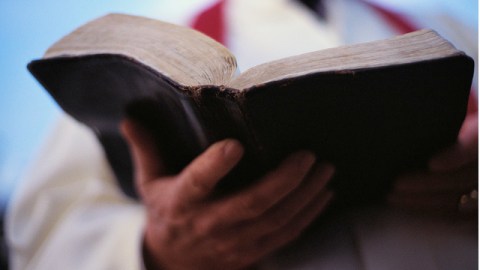#21: Mandatory Bible Study

Yale professor David Gelernter tells Big Think that America should acknowledge its identity as a Judeo-Christian society and mandate teaching of the Bible in our public schools.
America is a pluralistic society, but the “humane and liberating power of the American idea” which allows for such diversity is a direct result of the Judeo-Christian tradition upon which our nation was founded, says Gelernter. “Judeo-Christian thinking and teaching has been the most progressive, spiritually-liberating and humane phenomenon in human history.” Plus the Bible is the most influential book in history, he says. “How can we afford to let our children grow up ignorant of it?”
Americans, in particular, should understand the Bible’s unique role in the founding of our nation, which Gelernter calls “the most important political advance in human history.” Not only did America reintroduce the modern world to democracy (guaranteeing freedom of speech, press, and religion)—it also introduced the idea of a national government with no national church. Paradoxically, this freedom of religion and absence of a national church were made possible because of our founders’ progressive Judeo-Christian beliefs, “especially the ‘Hebraid Christianity’ of the Puritans and of many 17th and 18th-century Anglicans or Episcopalians,” he says.
America is and always has been a ”biblical republic,” says Gelernter. He concedes that America and Christianity have failed at times to live up to their high ideals. “But no nation has ever struggled harder to correct its faults and live at peace with its conscience,” he says. And this idea is expressed best in Abraham Lincoln’s Second Inaugural address, in which he calls upon Christian virtues to unite the divisions caused by war and slavery:
“With malice toward none, with charity for all, with firmness in the right as God gives us to see the right, let us strive on to finish the work we are in, to bind up the nation’s wounds, to care for him who shall have borne the battle and for his widow and his orphan, to do all which may achieve and cherish a just and lasting peace among ourselves and with all nations.”
These religious ideals espoused by Lincoln are inherent to our being Americans, Gelernter believes: “‘With firmness in the right as God gives us to see the right” is and has always been—and God willing, will always be—the guiding ideal of this nation.”
Takeaway
Americans know shockingly little about the Bible, even those who consider themselves religious. According to Pew Forum on Religion & Public Life, 78.4% of Americans self-identify as Christians, yet 60% of Americans can’t name five of the Ten Commandments, and 50% of high school seniors think Sodom and Gomorrah were married. The 1963 Supreme Court decision Abington School District v. Schempp banned devotional Bible reading in schools, but it doesn’t ban teaching the Bible as history and literature. “To let our children grow up ignorant of this book is culpable negligence,” says Gelernter.
Why We Should Reject This
“The United states government and public schools have no business promoting a majority view over other minority views,” says Barry Lynn from Americans United for Separation of Church and State. He tells Big Think that “when you start teaching a class about one religion you’re already making a judgment that the constitution doesn’t permit—which is the most important religion to study.” And Gelernter’s suggestion, he says, is even worse because it adds the argument that the Judeo-Christian tradition is a worldview uniquely suited to doing good works.
Lynn also questions Gelernter’s assertion that Judaism and Christianity are solely forces for good. This view “underestimates the damage that these religions have perpetuated and the delays in social progress they sometimes have caused.” Christianity, for instance, is largely to blame for the genocide of the American Indians, he says, based on the settlers’ belief that manifest destiny entitled them to the West even if that meant killing bothersome natives. “If you’re going to talk about any religion, you have to look at it warts and all or you do a disservice to the idea of education,” he says.
Lynn admits that it would be impossible to talk about, say, Faulkner or Shakespeare without addressing allusions to the Bible. But that doesn’t necessitate a separate class on the Bible. Teachers should “address the religion when it comes up as a natural part of discussion in any subject,” he suggests.
More Resources
—U.S. Religious Landscape Survey by the Pew Forum on Religion & Public Life [PDF]
—More information about the Abington School District v. Schempp case





